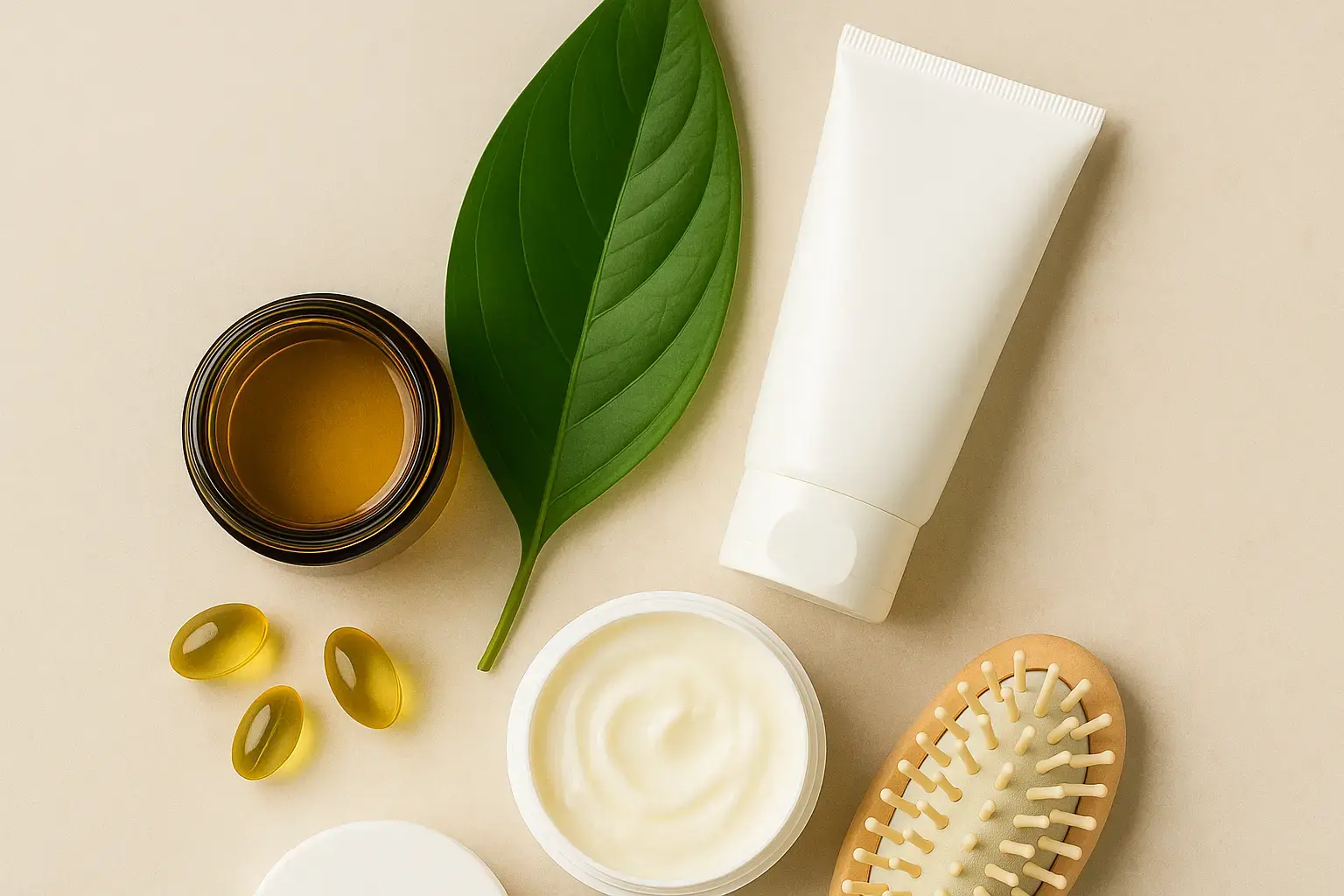What Is Vitamin E?
Vitamin E is a fat-soluble antioxidant naturally found in foods and available as a supplement or topical oil. Known scientifically as tocopherol, it plays a crucial role in protecting your body from oxidative stress, which damages cells and accelerates aging. While it's most praised for its ability to nourish skin and hair, Vitamin E also supports the immune system, eye health, and heart function.
In 2025, more dermatologists recommend using topical Vitamin E due to its anti-aging, wound-healing, and moisturizing properties.
Natural Sources of Vitamin E
Before you reach for a supplement, remember that your body can absorb Vitamin E through a healthy diet. These are some of the best natural sources:
- Leafy greens (spinach, kale, asparagus)
- Nuts and seeds (sunflower seeds, almonds)
- Vegetable oils (wheat germ, sunflower, and safflower oil)
- Whole grains, beans, and olives
- Eggs, corn, and avocado
- Fatty fish and some meats
Skin Benefits of Vitamin E (Backed by Science)
1. Deeply Moisturizes Dry Skin
Vitamin E forms a protective barrier that traps moisture in the skin. It’s especially useful during winter or for those with eczema and psoriasis.
Study: A 2023 review in the Journal of Dermatological Science found that Vitamin E oil significantly improved skin hydration in patients with dry, flaky skin.
2. Reduces Dark Spots and Pigmentation
Vitamin E helps lighten hyperpigmentation and sun spots by blocking the formation of melanin.
3. Heals Scars and Wounds
Applied topically, Vitamin E has been shown to accelerate wound healing and reduce the appearance of scars, including post-acne marks and stretch marks.
4. Fights Signs of Aging
Vitamin E neutralizes free radicals that lead to wrinkles, fine lines, and dullness. Regular use can help maintain youthful, firm skin.
5. Protects Against UV Damage
Although it’s not a substitute for sunscreen, Vitamin E strengthens the skin’s natural defenses against harmful UV rays and pollution.
6. Soothes Burns and Skin Irritation
A small amount applied to sunburns or minor burns can reduce redness and promote healing.
Hair Benefits of Vitamin E
1. Improves Scalp Circulation
Vitamin E enhances blood flow to the scalp, nourishing hair follicles and promoting stronger growth.
2. Strengthens Hair Shafts
The antioxidant properties protect against breakage, especially if your hair is frequently styled or heat-treated.
3. Fights Split Ends and Frizz
By locking in moisture, Vitamin E tames frizz, adds shine, and helps reduce split ends.
4. Delays Premature Graying
Its role in cell regeneration and circulation may slow the onset of gray hairs in some people.
Pro tip: Mix Vitamin E oil with coconut or castor oil and massage it into your scalp once or twice weekly for visible results.
Other Health Benefits of Vitamin E
- Lowers LDL (bad cholesterol) and supports heart health
- May help with Parkinson’s symptoms and Alzheimer’s prevention
- Supports eye health, potentially reducing cataract risk
- Eases PMS symptoms and helps regulate menstrual cycles
- Reduces joint inflammation and supports immune response
How to Use Vitamin E for Best Results
For Skin:
- Direct Application: Puncture a Vitamin E capsule and apply the oil to clean, dry skin before bedtime.
- Mix with Moisturizer: Add a few drops to your night cream or aloe vera gel for deeper hydration.
- Face Mask Booster: Combine with honey and yogurt for a natural glow treatment.
Note: Always perform a patch test first if you have sensitive or acne-prone skin.
For Hair:
- Overnight Oil Treatment: Mix Vitamin E oil with coconut, olive, or almond oil. Massage into scalp and leave overnight.
- Leave-In Serum: Apply a few drops to wet hair ends to reduce frizz and add shine.
People Also Ask: Modern Answers (2024–2025)
What will Vitamin E do for skin?
Vitamin E helps hydrate, repair, and protect your skin. It reduces dark spots, softens fine lines, and can improve skin texture within weeks.
Source: Dermatol Ther. 2023
Is it okay to put Vitamin E on my face?
Yes, especially at night. Vitamin E is best used as an overnight treatment to heal and renew your skin. If you have oily skin, use it in diluted form.
Source: Int J Cosmet Sci. 2024
Is Vitamin C or E better for your face?
Vitamin C brightens and protects; Vitamin E soothes and repairs. For optimal results, use Vitamin C in the morning and Vitamin E at night.
Source: JCAD 2024
Can Vitamin E help clear skin?
Vitamin E can help fade acne scars and reduce inflammation, but it is not a direct acne treatment. Avoid on active breakouts if your skin is sensitive.
Source: JAMA Dermatol. 2024
Tips for Getting the Most from Vitamin E
- Apply to clean skin only
- Use at night for best absorption
- Choose cold-pressed oils or natural capsules
- Pair with Vitamin C and a healthy diet
Final Thoughts: Is Vitamin E Worth It?
Absolutely. Vitamin E offers a natural, affordable, and effective way to care for your skin and hair. Whether you're dealing with dryness, aging, scars, or dullness, this powerful vitamin is backed by both science and tradition. With consistent use and a healthy lifestyle, Vitamin E can help you maintain glowing skin, shiny hair, and stronger overall wellness in 2025 and beyond.
References
- Dermatology and Therapy, 2023 – Topical Antioxidants and Skin Rejuvenation
- International Journal of Cosmetic Science, 2024 – Vitamin E Effects on Human Skin
- Journal of Clinical and Aesthetic Dermatology, 2024 – Antioxidant Synergy in Skin Care
- JAMA Dermatology, 2024 – Vitamin E and Post-Acne Pigmentation Recovery
- Nutrients, 2023 – The Role of Vitamin E in Human Health
















